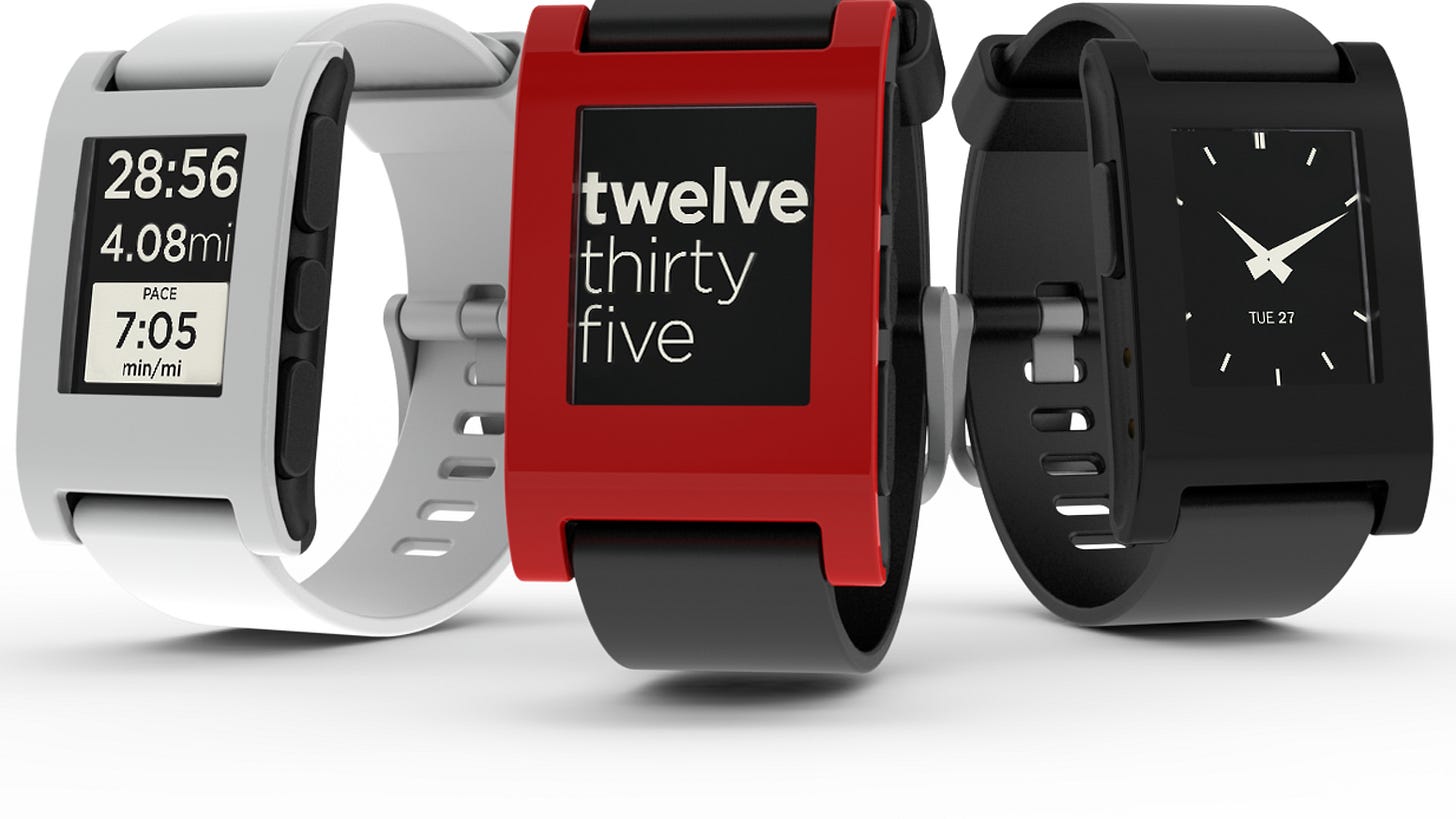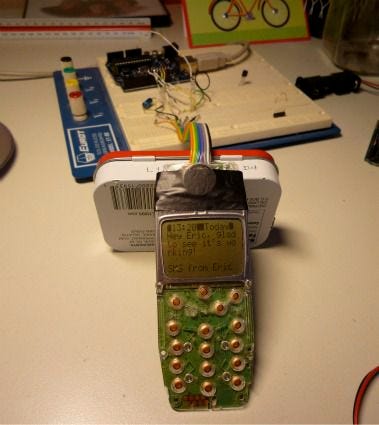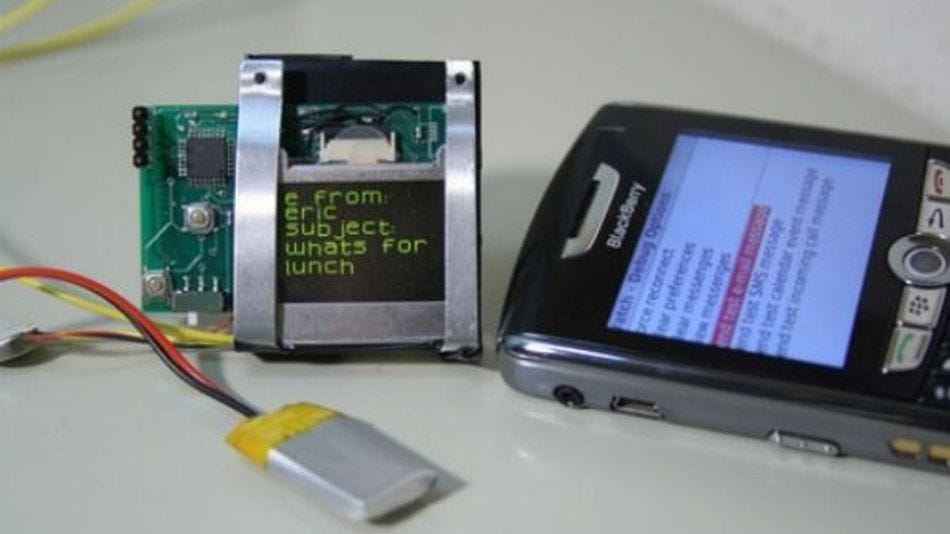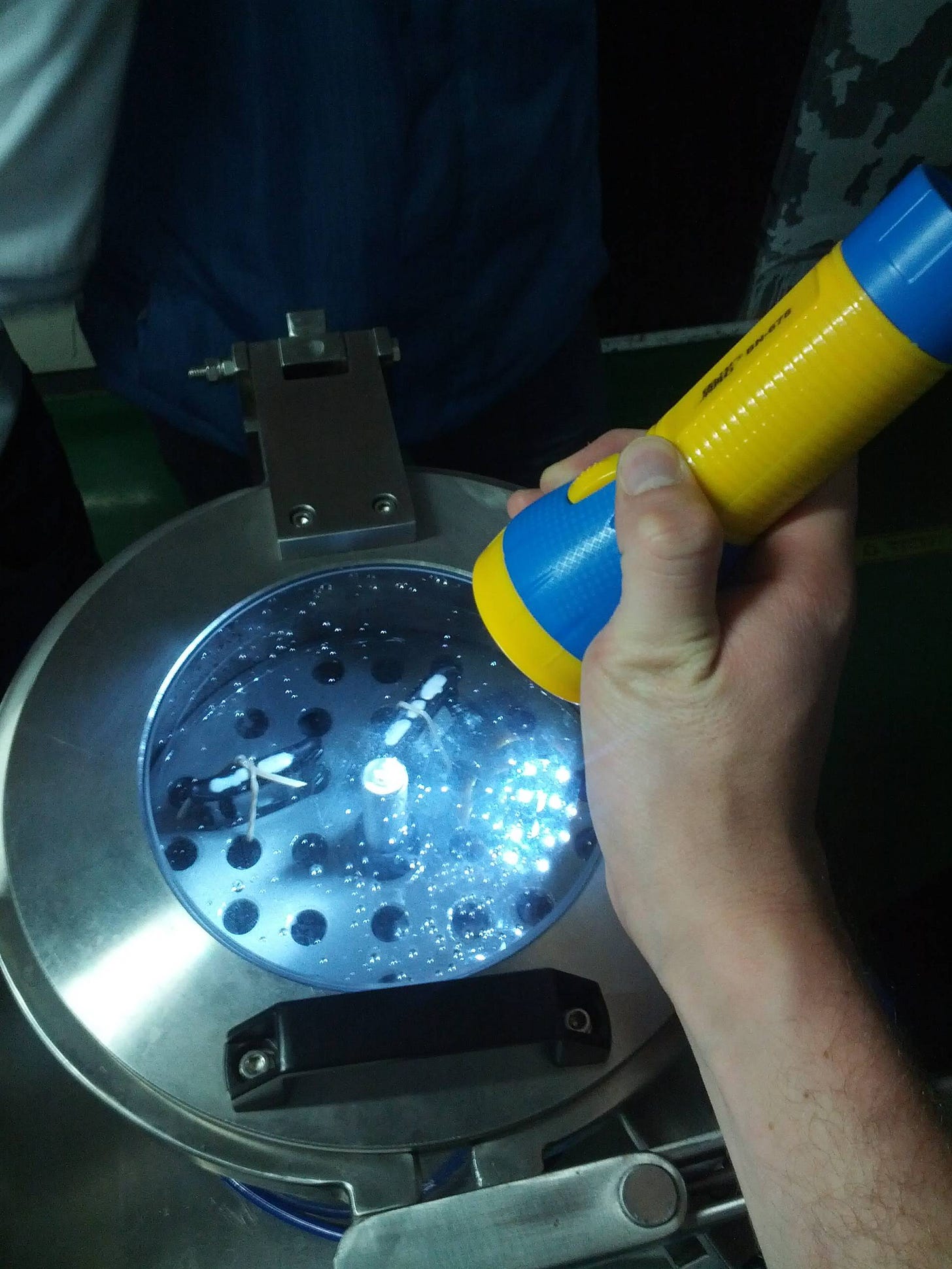MachinePix Weekly #48: Eric Migicovsky, Founder, Pebble
Eric shares his learnings from building a consumer hardware company, what's changed over the last decade, and what he's excited about. This week's most popular post was a mysterious mechanical watch ⏱
This week I sat down with Eric Migicovsky, creator of Pebble—the first smartwatch with major commercial success. He’s now a partner at startup accelerator Y Combinator and running his new company Beeper.
Eric shares his hard-learned lessons in building from zero to millions in sales and selling the company to Fitbit; we also talk about what’s different now for electronics startups (hint: a lot, and it’s great!) Still have a Pebble? Eric pointed me to Rebble—a community of hackers working to provide continuing support for Pebble watches.
In the spirt of watches, the most popular post this week was a mystery dial watch movement by Konstantin Chaykin. It’s exciting to see contemporary horologists experiment with modern materials and manufacturing techniques, rather than leaning on heritage. How does it work? I’ll let you Google it.
I’m always looking for interesting people to interview, have anyone in mind?
—Kane
Interview with Eric Migicovsky
When you started Pebble in 2008, it wasn’t obvious at all that smart watches would be a thing. What made you take on the challenge?
I wasn't building it because I thought smartwatches would be a thing. I built it because I really wanted it, I thought it would be a pretty damn cool gadget.
And I looked around at other smart watches. I mean, there weren't really smartwatches—I think Sony Ericsson made an analog watch that had a 10 character alphanumeric display? And it was like 350 bucks. And I said, well, I don't have 350 bucks—so I decided to make one instead.
What was the hardest part about designing a smart watch then, before there was any precedents for these devices?
I think we were super naive. We didn't know how to build products. We’d never worked in a consumer electronics company. So we just kind of walked in and just started doing it without really knowing what we were getting ourselves into. The first version was just built with an Arduino, and I took the screen off of an old Nokia 310. You remember that? One of the candy bar Nokias.
We got pretty far. We got to the point where it was actually connecting to a smartphone and receiving like the time and messages. But it wasn't a company, it wasn’t a product. It was just a little hacked together device. I had a feeling that it would become a company, but we didn't design it with a company in mind. And so, you know, looking back, we made tons of really elementary mistakes. I think, would we have designed the same product or would we have gotten to the same level if we had tried to treat it like a company? I don’t know! I think a lot of the time we just made it because we were having fun and it felt like a really cool gadget. It took five years before we launched on Kickstarter.
What’s your craziest experience from designing and building the first Pebble?
So after we launched on Kickstarter, we had like a real product on our hands. One that we tried to design for manufacturing and actually took away to scaling. I was just talking about this the other day: one of the craziest experiences we had was just getting on a plane and flying to Shenzhen. We started meeting with factories in 2012, and it wasn’t what I expected it to be at all. Shenzhen is a fascinating city for electronics.
The only stop on the trip that felt like the stereotype of a factory was this packaging factory, where they make pulp tray inserts for shipping boxes. It was in the middle of nowhere, a massive industrial facility. There was like a 50 foot tall press machine that was compressing a slurry of pulp fiber into those brown inserts. And that was pretty cool, but Shenzhen overall, and realizing how electronics actually get designed and manufactured, was a crazy experience. Especially for us, since we’d never made consumer electronics before.
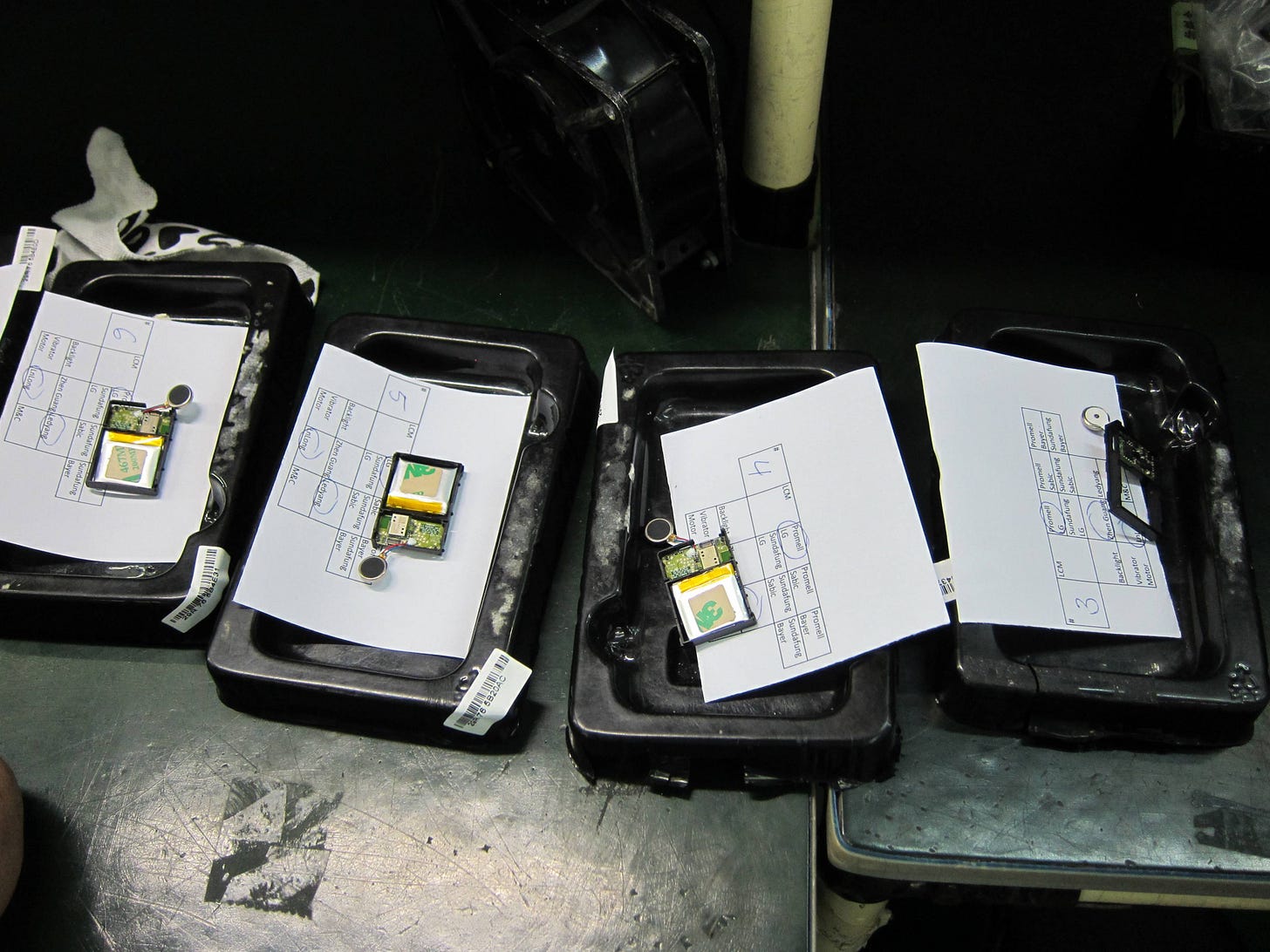
Apple Watch was announced in 2014, and it must have been a tough competitor for Pebble. How did things change for Pebble after they entered the market?
Well, it's funny actually, even before they walked into the room, that was the first thing on everyone's lips. So by the time they announced it, it actually felt kind of relieving because there's only so many things you can answer against an unknown, ill-defined product. Like before it was announced it could be anything. And then after it was announced and had a price and had specs and facts.
Obviously Pebble's not around today. I wouldn't say that it's not around because of the Apple Watch. If we were stack ranking the list of reasons why pebble doesn't exist right now, the Apple Watch would probably be fourth or fifth on the list.
If not the Apple Watch, what are the top three reasons Pebble no longer exists?
I think that the main one was we didn't really have a firm vision for the future. We kind of stumbled into making smartwatches with our 2012 campaign, but we didn't have a multi-year vision for where we were taking wearable computing.
Or at least I didn't really define it. We just kind of kept building products on a six to twelve month cadence and coming up with a new watch every 12 months. That's not a recipe for building a company. That's just how you build products. This worked for a while. When it stopped working, we didn't really know what to do. Our normal approach, which was to make more watches, wasn't working. I didn't have the kind of defined vision that could lead a company through a year of shitty sales and not hitting our forecasts and not having, you know, having a bit too much inventory to cover the cash.
It sounds like there were a few hard learned lessons at Pebble. Looking back, what did you learn the hard way you wish you’d known going in?
The thing that can be most helpful for other hardware founders is to understand early on the business model that your company is using and all the trade offs. In our case, we were making money selling hardware one-time. We also had services that we would include with this, and we had software that we were continually publishing for the watch—but the business model was such that we had to come out with a new product and convince people to buy it again in order to make more money and. Looking back, I think that I didn't recognize that early enough, or how important the margin structure was, or how much it would cost to maintain the software team that was necessary to kind of compete and build a beautiful platform.
There's tons of different business models hardware companies can take on, and we just chose one where we sold the watch for $150-$200 and kind of followed the rule of threes: a third of it is the BOM cost, a third of it goes to distribution, and a third of it is hopefully profitable. If I were doing it again, I would think, you know, what other business models are potentially accessible for a product like that? Is there a subscription component? Should we have charged more? Should we have potentially not gotten into as many channels? We launched in retail, we launched in Best Buy; should we have just kept it as a B2C product and kept more of the margin for ourselves and sold less units? I don't think I really had the foresight or the ability to understand that there were choices around the business that I could have made earlier. I was very focused on building the watch.
Since Pebble’s sale to Fitbit, you’ve been a partner at the startup accelerator Y Combinator. What’s changed for hardware startups since you started Pebble?
Man, it is so much easier to start a company now than it was 15 years ago. I’m kind of like the old guys sitting on this lawn talking to the young whippersnappers. Everything is incredibly exciting—software companies have enjoyed services like AWS for the last 15 years, but hardware companies are finally getting the rails to move much faster.
Look at a company like Wyze. They're using hardware that's generally made in China. ODM by various factories and they go and they talk to manufacturers and they talk about the specs and they don't have to spend years in any kind of product development. They kind of look at what's available out there, put it together, build software that attaches services and pull these devices together. And instead of having to have a full-blown ID team and a giant EPM production management team, they outsource a lot. And I think that that's kind of the prototype of fast moving new product development companies. You don't need everyone in-house. You don't need to design everything yourself. You can use different platforms.
Another good example would be the ESP32. That thing's amazing. You can basically start an entire company just by writing software that works on an ESP and break out board. You just have to find the right business application or the right problem to solve. I think that story has now been played out to great success. Dropcam was kind of an early example of that, the ODM model.
It just seems like companies can now move much faster. Hardware companies have always thought of themselves as different from software companies because they have this added complexity of having to spin boards and do prototype runs, that kind of thing. When in reality, like the hardware startup exists for the same reason as a software company, it's to solve a problem. And I think hardware companies, hardware founders now, can spend less time worrying about the nitty gritty bits of hardware and focus on asking “am I solving a real problem for users?”
What’s the next format of consumer electronics that you’re excited about?
I continually think that AirPods and similar are some of the best new gadgets in the last five years. For me, a successful product is one that you use on a regular basis that kind of becomes part of your life, that you rely on, that just kind of blends into your life. And AirPods didn't exist five years ago. We didn't carry around as many headphones in the same way that we do now. Probably the success of video conferencing over the last year has been because people have these headphones in their pockets. Hopefully in the future, people will take advantage of this and maybe build more interesting software applications because this piece of hardware is now sitting in our pocket.
Is there a specific product you really admire right now?
I got a LIDAR based vacuum cleaner recently, and I had one of the dumb non-LIDAR vacuum cleaners. And it's amazing how much better the LIDAR vacuum cleaner is. Which is crazy because like how much were sick LIDARs five or ten years ago? They must've been tens of thousands of dollars.
And now my $200 vacuum cleaner has one. I don't think the impact of $20 LIDARs has been felt yet. I felt like there are a lot more things that can benefit from a high resolution 2D, 3D rangefinder.
What product would you love to see someone create? It doesn't even have to be a good business, just something you’re like “man, I just wish this was real.”
Did you see the demo for that Google portal screen that used some sort of 3D display such that you could just sit in it, the other person could sit anywhere else in the world, and it just felt like the other person was across from you. That would be pretty darn cool.
Zoom and everything is nice, but just now that I'm getting back to going out for lunch with people and it's amazing how much do you lose over the kind of crappy connections that we have. So I think something like that where you could actually feel like you were sitting across from someone at the table, that would be pretty cool. My camera placement is about a foot, half a foot above where the eyes are. The eye contact thing is really off-putting.
Any side projects you’re working on right now?
I started a new company called Beeper! I also just had a kid, just a little kid and he is taking up a fair amount of time. He'll need some cool gadgets at some point, but he is not making anything yet except for messes.
Any favorite books or books you’re reading now?
The new Project Hail Mary book by the guy who wrote the Martian. It's pretty good. I read his second book, which was definitely not as good as his first one—but this new one he definitely just took the Martian and changed the plot a little bit, but it's quite good. A page turner.
What’s your favorite simple (or not so simple) tool or hack that you think is under-appreciated?
My hack last year was getting a desktop computer. I’ve been using MacBooks and laptops for the last ten years. Holy crap, for $900, I bought an amazing computer and I can't imagine using a laptop anymore. It’s this infinitely powerful 64 GB RAM machine and I just don’t worry about computing anymore. Any number of tabs, whatever.
The Week in Review
This is a lot faster than some precision demolitions that I’ve previously posted.
I always thought unloading bulk carriers would be more sophisticated than just scooping it out; maybe because I’ve posted trains with clever unloading systems.
Oh boy, a lot of drama around this one. I guess I should have specified that the chicken was already dead before it went into the machine. The only other post I recall with this much drama was the crab processor.
Postscript
My coworker Lee shipped a new website for our company, Root Ventures. See if you can find all the Easter eggs.
I’ll also be guest-editing next week’s issue of The Prepared, so give it a look if you want more means to procrastinate.
I am always looking to connect with interesting people and learn about interesting machines—reach out.
—Kane





